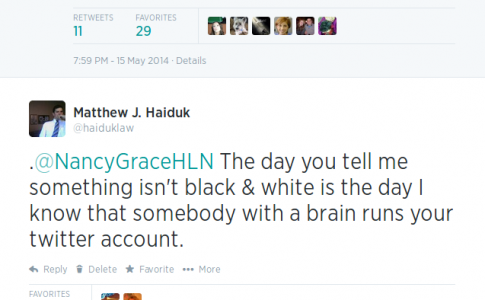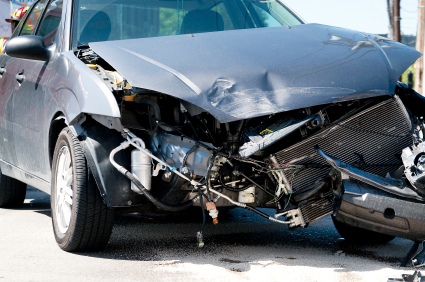Earlier this week somebody forwarded me the Economist article on eliminating plea bargaining. Like most mainstream suggestions on how to “fix” the system I ignored it because… well, because I don’t care what the Economist has to say about criminal law. I don’t think that’s unreasonable. Continue reading “…But The Problem Isn’t Plea Bargaining.”
Tag: the System
The Revolution Will Not Be Twittervised, Apparently.
I like twitter. It’s fun. Not just fun because you can “interact” with Nancy Grace, but also fun because you can “interact” with Sheriff Joe Arpaio. I like to think he gets as much out of our exchanges as I do. I could be wrong, though.
.@RealSheriffJoe @Riggs4AZgov nobody cares.
— Matthew J. Haiduk (@haiduklaw) July 22, 2014
Twitter can can get a little repetitious. Sometimes all you want to do is scroll through and learn if the Iron Sheik would prefer to watch “White Chicks” or “Ghandi” and people are blowing up your timeline with 65 straight tweets about #DanceMoms. Reading all of the repetitious stuff can give a man a fairly distorted view of reality– Especially if you are “subjected” (which I put in quotes because you really don’t have to follow anything on twitter you don’t want to… but I can’t help myself), to the tweets of the “justice system.”
“Justice system” means, of course, police, prosecutors, and those of the rest of them that are just trying to keep the world safe… As opposed to us who are just trying to “get all those guilty people off.” Because all that they want is for the truth to come out. We’re immoral, hired guns, doing whatever our obviously-guilty clients tell us to do. We don’t care about truth, right?
One day I’m flipping through the tweets from one of my favorite prosecutor’s offices and I noticed an unusually high number of convictions getting “tweeted” about. As a tax payer, I suppose I should be grateful for a one-billion-percent conviction rate. Call me ungrateful, then, but I couldn’t help but inquire about the hall-of-fame batting average they were putting up:
Elgin man guilty of multiple offenses stemming from domestic attack. http://t.co/Iedmvmdtj0 — Kane County SAO (@KaneSAO) July 28, 2014
Carpentersville man who made false bomb threat pleads guilty to multiple offenses http://t.co/zLnlH56BZj — Kane County SAO (@KaneSAO) July 28, 2014
All of these press releases seem to have a common theme. “@KaneSAO: Aurora man guilty of home invasion http://t.co/d7pMyBkfcF” — Matthew J. Haiduk (@haiduklaw) July 9, 2014
They never responded because, well, I’m not worth responding to. So, I let it go. They do their thing, I do mine, and who really cares what happens on Twitter, anyway?
Then a crazy thing happened. Today, while I was doing some work, minding my business, and trying to get pumped I got a text from a friend. Turns out he was not intimidated by the prosecutor’s office lifetime undefeated streak and he went to trial. Apparently, the trial wrapped up, the jury went out and, a short time later, the jury returned a “two word” verdict (HINT: “guilty” is only one word).
Aurora woman guilty for soliticing murder. http://t.co/kZY2tbrK8J — Kane County SAO (@KaneSAO) July 17, 2014
Maricela Arciga of Aurora guilty of solicitation of murder and solicitation of murder for hire. Faces minimum 20-year prison sentence. — Kane County SAO (@KaneSAO) July 17, 2014
Aurora man guilty of burglary for 7th time. http://t.co/qYSOc6kuio — Kane County SAO (@KaneSAO) July 16, 2014
Aurora gang member with criminal past gets prison for gun possession. http://t.co/ua5EVPKUqW — Kane County SAO (@KaneSAO) July 11, 2014
Immediately I turned to twitter. I was interested to see how their twitter account would deal with the first loss ever in the history of the office. Would there be a link to a press release? Maybe just a 140 character statement? Would they explain this inexplicable verdict? “Congrats to the defendant… the evidence wasn’t there and the system worked.” Would it be like Lou Gehrig, with absolute grace in the face of horrific news?
We’re never going to know.
It’s the unfair fight, again. Police and prosecutors frame the news. We don’t. We win something, and we walk away. We have to. Just like I said in February:
If I won a trial today and issued a press release naming names and pointing fingers, it might be fine today. Tomorrow, though? Tomorrow I’m right back at it (probably with the same prosecutor) but for a different client. What I don’t want is this client to get a bad (or no) offer because I embarrassed the prosecutor on the last case.
Thankfully I’ve still got Nancy Grace and Sheriff Joe. And, thankfully for them they’ve still got me.
Aurora man guilty of home invasion http://t.co/Zi0ALcCEPQ
— Kane County SAO (@KaneSAO) July 9, 2014
aurora man pleads guilty to sexually assaulting two children. http://t.co/4KL7gm4hBB
— Kane County SAO (@KaneSAO) July 2, 2014
Illinois Appellate Court affirms Kane prison sentence for contempt: http://t.co/68kaNMnQis
— Kane County SAO (@KaneSAO) July 1, 2014
Elgin man guilty in Villa Street gang fight http://t.co/qg9dwYB9I9
— Kane County SAO (@KaneSAO) July 1, 2014
Three dumb things people say to the police… all the time.
So, you’re sitting in my office and you’re mad that you got a ticket or were arrested for DUI or are charged with murder. You’re going to fight this thing all the way. You’re mad. They never read your your rights. They never showed you the radar. If they didn’t do that, you must be “not” guilty, right?
For whatever reason, there seem to be a large number of people who, between the time they’ve last talked to the cops and the time they walk into my door, have convinced themselves they’re not guilty. That’s just fine. If you want to take the best shot at winning at trial, though, there are some things you probably said to the police that you shouldn’t have. Those things are going to make it really hard for a judge or jury to see just how not guilty you really are
When the police first pulled you over or started to talk to you: “Yes”.
Do you know how fast you were going? “Yes.” Do you know why we’re at your house with this warrant looking for a dead body? “Yes.” Do you have any idea why the neighbor says you were swimming naked in his pool at night and creeping out the entire neighborhood? “Yes.”
When the police ask those initial questions, they obviously know something. They’re not going to tell you what it is, but they’re going to try to get you to talk about it. After all, you may “know things only the killer would know.” If you answer “yes” to any of these initial questions, it’s going to start a dialogue- a dialogue that’s only going to get harder to stop.
Probably the only worse answer than “yes” would be to lie. Like, telling an officer at a traffic stop that you were going 47 when his radar says you were going 89. Lies are either going to frustrate the officer or (in a more serious case) make you look even more guilty when you’re busted.
A better thing might be to say, “I’d like to talk to a lawyer before I answer any of your questions.” Nobody seems to ever believe me on that, though. It’s sort-of a free country, I suppose. You go ahead and do what you want.
When they want to search: “Yes”
When it comes to car searches, this is almost always a follow-up to “do you have anything you shouldn’t in the car?” Of course, if that’s what happened you must have skipped the section above and either lied (hoping he’s not smart enough to know all the drugs are “hidden” in the trunk of your Chevy Vega), or answered “yes”.
So, now he wants to take a look. He’s asking you, and you don’t want to “look guilty” so you’re going to let him search.
Look, I know it seems a bit extreme, but no police officer is ever searching my car, house, body or other property with my consent. I have nothing to hide- just like you (except for those apples you’re illegally smuggling into Canada), but my stuff is nobody’s business and I don’t care how they think that makes me look. I’d be somewhat offended if they even asked.
Getting sucked into “not wanting to look guilty” is the best way to look absolutely guilty. Nothing says “this guy is probably guilty” like the weed the cop found in your pocket or the headless corpse in your crawl space.
If they ever ask to search, you can always tell them you’d like to talk to a lawyer about it first. Just saying.
When the police are interrogating you: “Yes”
You’re in some small room at the police station. The room is simple, without decor or anything but a small table and some chairs. There’s one cop- maybe two. They’ve read you your rights, and they’re asking you questions. They want to know how long you had “beef” with the guy who was just found stuffed in the back of a burned-out AMC Gremlin down by the river. “You’ve hated this guy since before that day at the Bieber concert, right?” They ask.
https://www.youtube.com/watch?v=5nq3FHm6DZ0
Wait a minute. You’re in custody. They read you your rights. They just told you that you had a right to an attorney. They told you that they’d get you one before any questioning.
Now you’e sitting there, without having talked to a lawyer, and you’re about to agree that you didn’t like some guy that they found dead?
Brilliant idea, Einstein. Especially if you didn’t kill the guy (or if you’re going to tell your lawyer you didn’t, anyway).
Just another crazy thought, but if you’re planning to contest the charges and try to avoid spending the rest of your life in prison, it might make sense to talk to a lawyer first. Probably.
[separator size=’small-center’/]
There you have it. You’re in my office. You want to fight this to the end. You’re mad that your rights have been violated. They can’t prove this case… except, of course, for the fact that you admit you knew why they were looking at you, let them search wherever they wanted and confessed after they read you your rights.
Can’t wait for your trial.
Nobody Cares If You Used To Be a Prosecutor
I’m in law school and think I want to be a prosecutor. It’s a noble profession, and all my friends and family approve. Why wouldn’t they? Too many criminals get off, and I’m feeling righteous so I’m going to do something about that.
So, before I even graduate, I’m looking to volunteer. I’m calling prosecutor’s offices all over- somebody could use some free help, right?
I work limited hours and summers for free as I finish out my schooling. I’m dedicated to my cause (and these jobs are competitive) so I go that extra mile and take criminal law classes in school. I even write my law school paper on the justice system, and how a more rigid system of penalties can fix the world’s problems. All of them.
The hard work pays off, too. I graduate, pass the bar and get hired on as an actual paid prosecutor. I love my job!
I start by working on traffic cases. Then I graduate to misdemeanors, and on to DUI. It’s a great job with great people, and I get to tell my friends and family how fun it is to put away all those “bad guys” that Nancy Grace talks about. I don’t bow to defense attorneys, and nobody gets a free pass on one of my cases!
One day, I’m sitting in court prosecuting people. All the sudden it dawns on me that even though I rock at this job and even though I’m fixing all the problems I whined about in law school, and even though my family knows I’m making the world a better place- even though there’s all of that, it’s like a switch got flipped and I want to defend people. Like, BAM! I can’t explain it but I’m just going to do it.
I don’t have any reason, let alone any good reasons.
That makes total sense, right? Of course it doesn’t. You know what makes even less sense? If I pretend (and advertise to the public) that being a former prosecutor makes me better at defending people.
Because, even though I’ve spent the better part of a decade locking people up and bragging to everybody about it, being a prosecutor is magic. It prepares you for everything. One day I was sitting in court and it just dawned on me… not only am I going to defend people for no real reason, I’m going to staff almost an entire office with people who formerly had zero interest in defending the accused.
Still makes no sense, right? If it does, you’re missing the sarcasm. You’re not the only one. (You can forward to about 41 seconds if you want to cut right to the part that makes me giggle).
He could have said he has a hard time sleeping knowing innocent people get convicted. Or that he doesn’t like that the system is more concerned with rules than the truth. Or, even, that the only way the system works at all is because there are people pushing back against the government.
He could have said any of that, or about a billion other things. He didn’t, though. Probably because none of that came to him.
You think former prosecutors have some awesome inside knowledge that makes them fantastic defense attorneys? Like, there is some secret handshake or prosecutor’s secret they teach you when you’re first starting out prosecuting speeding tickets? That’s exactly how it goes down. On your first day they call you into an office for a conversation that starts with, “If you tell anybody this prosecutor’s secret the whole world will collapse, but…”
I’ve said it before and I’ll say it again: there are some absolutely fantastic defense attorneys who were once prosecutors. There are also a lot of incredible defense attorneys who never prosecuted anybody. The idea that being a former prosecutor gives you a leg up on anybody is a ludicrous marketing technique. Nothing more.
Maybe next time he should let me write his youtube video. We can brainstorm real reasons to love this job. And we can talk about getting rid of that horrible, fake background.
Why Do Cops Let People Drive Drunk?
You know how drunk drivers are a danger? They cause accidents? You know how they kill people? You know how we can’t tolerate having impaired drivers on the road? You know how we are so gung-ho on punishing DUI that we won’t even tolerate a drunk driver pulling off the road to “sleep it off”?
Maybe none of that is true. Maybe it’s ok to let a drunk drive for a little bit. Or maybe keeping drunks off the road isn’t really as important as letting drunks on the road so we can then take them off the road and look like we’re doing some sort of good work. I don’t know.
I do know that last week I was watching a hearing on a DUI case up in good, old Woodstock, Illinois, McHenry County, U.S.A. From what I gathered (I missed a part), a cop was outside a bar late one night watching patrons as they leave. Nothing illegal about that- it seems that that’s the sort of place drunk drivers might be coming from. Good policing there.
Our hero watched a man leave the bar and cross the street. Apparently the man stumbled or fell… his movement was so obviously impaired by what was likely alcohol that the officer moved his car around to get a better view of where the guy was going. From the second spot, the officer watched the man get in the car and start it all up.
Then the officer did exactly what you’d expect him to do… Nothing. Once the man started the car and drove away, the officer followed. Of course, the man who couldn’t walk couldn’t drive either and, after watching him swerve all over the road the officer pulled him over and ended up arresting him for DUI.
Good police work you say? I don’t know.
Can’t a drunk driver kill somebody in a blink of an eye? Isn’t no distance the acceptable distance for an impaired driver to drive? Or, is there some magic rule that a drunk driver can’t plow into an innocent family as long as a cop is watching? Shouldn’t DUI prevention actually mean prevention regardless of who is watching? Safety is safety, right?
I know what you’re saying- this is America and a cop can’t tell the dude he’s not allowed to drive. I agree with that. But, this is also America and a cop can walk up to a drunk man, tell him that if he drives he’s going to get pulled over before he gets out of the parking lot, and strongly suggest the man call a friend or a cab. If cops can talk people into confessing to murder (even murders they never commit) can’t they talk people out of driving? Maybe my way is just silly.
My way doesn’t risk a drunk man on the street possibly killing somebody, though. My way doesn’t leave open the possibility of a high-speed pursuit with a drunk man at the wheel. My way also doesn’t net anybody an arrest or another smiley face on the record from AAIM.
My way keeps the streets safer, though. Isn’t that really what’s most important?



